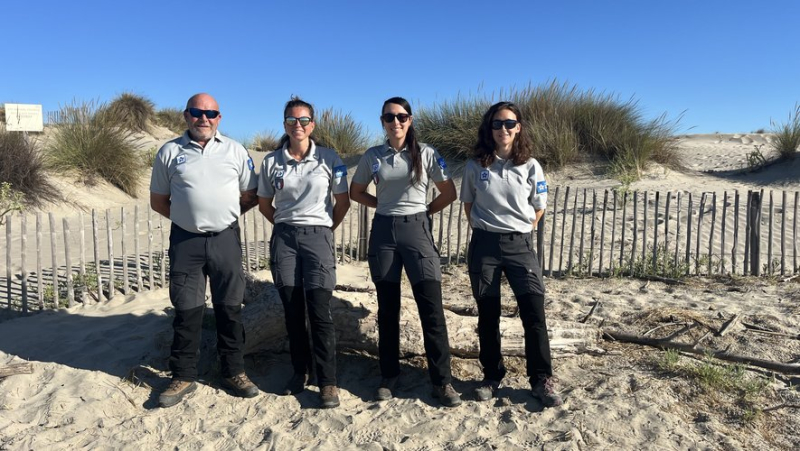Coastal guards of the Lido de l’Or: highly diversified missions for the preservation of natural spaces

The team of coastal guards who officiate on the lido of the Pays de l'Or. DR – Pays de l'Or
The team of coastal guards of the Communauté d'agglomération du Pays de l'Or manages and maintains nearly 1,000 hectares of natural spaces on the territory of the community. A titanic task for a team of 4 people. Detailed review of their missions.
No two days are the same and the missions are very diverse. This is normal: preserving nature does not wait, especially in sites that are particularly busy. Between dune ridges, salt meadows and forest environments, there is no shortage of activities for the four coastal guards in charge of the natural spaces of the Pays de l'Or. Supported by two eco-guards in the summer season, their interventions are carried out at different levels.
Management, reception and monitoring
"The management of natural spaces, it’is the core of our business“, says Aurélia Dubois, the urban area's coastal guard. With farmers, hunters and visitors, coastal guards carry out awareness-raising and communication work on the uses of the sites. In addition to the welcome they give them, they ensure that protection is understood and shared by all.
Water management is also their responsibility. In Petit and Grand Travers, the marshes are exposed to salinity because they are connected to the sea, which endangers the marsh habitats. "NWe therefore ensure that we always have optimum levels of fresh water in the marshes, which we regulate by manipulating the hammer mills", she explains. Surveys of the salinity of the marshes are carried out regularly, as well as on the flora and fauna as part of environmental monitoring.
Maintenance and monitoring
Coastal guards also ensure that the land is well maintained and protected. To do this, they carry out a whole series of work: repairing slats, manually removing invasive species, pruning vegetation, cutting branches, etc. For some work, organizations and associations come to lend a hand.
Site surveillance and environmental policing are also part of their duties. In high season, “it's the big priority of our actions“, she acknowledges. Their role is to verify that no infringement is committed by users in order to avoid excessively negative impacts on the sites.
Crossing dunes off designated trails, tearing up vegetation, damaging or stealing equipment, and abandoning waste are among the most common offences. Depending on their degree of impact on the site, users caught red-handed are liable to a fine of 135 to 1,500 euros, or are subject to a report, coupled with a fine ranging from a hundred to several thousand euros.
The multiplicity of tasks makes coastal guards real “Swiss army knives”. In fact, we adapt according to emergencies and different missions. But to preserve this natural heritage which is a real treasure, we must all work together. What people don't always understand. We, in all cases, give 1,000% to preserve it, while seeking balances between preservation and attendance“, she concludes.
I subscribe to read the rest




